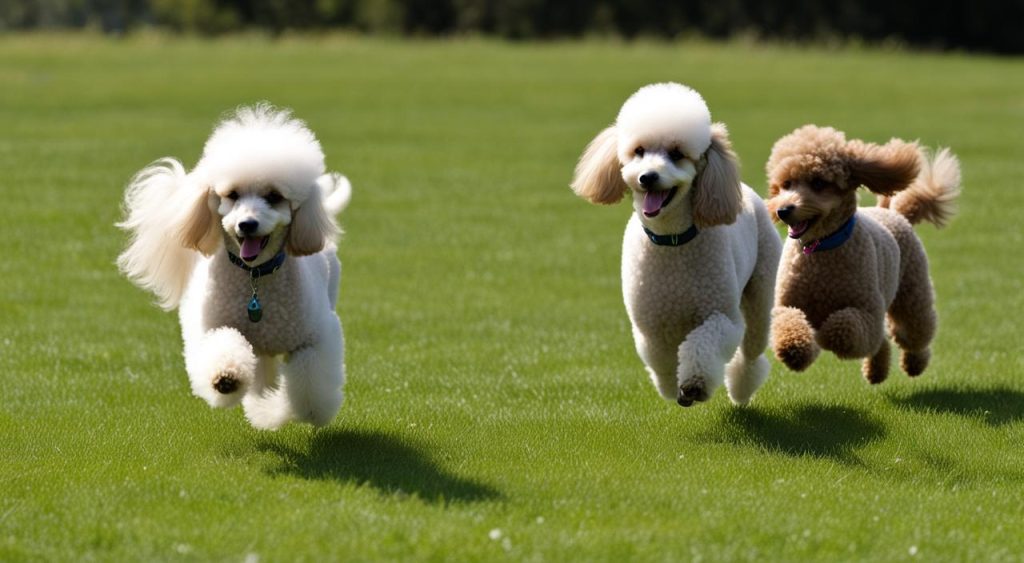The health and lifespan of a Poodle can be influenced by its size and breeding practices. Generally, Poodles are considered to be a healthy breed, but certain factors can contribute to the overall health of different size variations. Poodles bred with other breeds to create doodle mixes also tend to be healthier due to hybrid vigor. Standard Poodles have an average lifespan of 12-14 years, while miniature Poodles can live up to 14-16 years or more. It is important to choose a reputable breeder who conducts genetic health screenings and tests for conditions such as progressive retinal atrophy and hip dysplasia to ensure your Poodle is healthy.
Key Takeaways:
- Size and breeding practices can impact a Poodle’s overall health.
- Poodles bred with other breeds tend to be healthier due to hybrid vigor.
- Standard Poodles have an average lifespan of 12-14 years.
- Miniature Poodles can live up to 14-16 years or more.
- Choosing a reputable breeder who conducts genetic health screenings is important.
Factors Affecting Poodle Health by Size
The size of a Poodle can significantly influence its overall health and susceptibility to certain health issues. Understanding the factors that affect Poodle health by size can help you make informed decisions when it comes to caring for your beloved companion.
When it comes to larger Poodles, such as Standard Poodles, there are specific health considerations to keep in mind. These majestic canines may be more prone to orthopedic issues like hip dysplasia and gastric dilatation with bloat. These conditions can cause discomfort and potential complications, affecting their overall well-being.
On the other hand, smaller Poodles, such as Toy and Miniature Poodles, tend to experience fewer joint and mobility problems due to their smaller size and lighter weight. This can provide them with an added advantage in terms of their overall health and quality of life. Additionally, their compact size makes them easier to manage and assist with mobility if the need arises.
To ensure the optimal health of your Poodle, regardless of size, it is crucial to provide them with appropriate exercise and a balanced diet. Regular physical activity helps to maintain joint health and overall fitness, while a nutritious diet supports their energy levels and supports their immune system.
In conclusion, understanding the factors affecting Poodle health by size is essential in providing the best possible care for your furry friend. By considering the specific health considerations associated with each size variation and providing appropriate exercise and nutrition, you can help your Poodle lead a healthy and vibrant life.
Choosing the Healthiest Poodle Size
When it comes to choosing the healthiest Poodle size for you, it’s essential to consider your lifestyle and the specific health considerations associated with each size. By making an informed decision, you can ensure the well-being and happiness of your furry companion.
If lifespan and mobility are important to you, opting for a smaller Poodle, such as a Miniature or Toy Poodle, may be the ideal choice. Smaller Poodles tend to have longer lifespans and fewer joint issues. Their compact size also makes them well-suited for indoor living and easier to manage in smaller living spaces.
On the other hand, larger Poodles, like Standard Poodles, might be a better fit for those with active lifestyles and outdoor spaces. They have more energy and require more exercise, making them great companions for long walks or even jogging. Keep in mind that larger Poodles may be more prone to certain health conditions, such as hip dysplasia or bloat, so regular vet check-ups are essential.
Regardless of the Poodle size you choose, it is crucial to select a Poodle from a reputable breeder who conducts thorough health screenings. This ensures that you bring home the healthiest and most genetically sound puppy. Health considerations for different Poodle sizes should always be a priority to give your furry friend the best quality of life possible.





